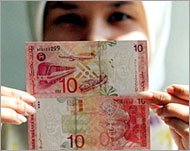Baby-selling big business in Malaysia
Baby-selling gangs are thriving in Malaysia, fuelled by a shortage of infants available for adoption.

“The big demand for babies, especially among infertile couples, has fuelled a lucrative but illegal adoption racket,” said deputy director for criminal investigations, Nawawi Ismail, on Monday.
“They are willing to pay a high price to meet their demand because the supply is scarce,” he told a forum on child exploitation, adding that 35 babies had been rescued since 2002 and 47 people arrested in connection with the trade.
Infants are being sold in Malaysia for between 5000 and 18,000 ringgit ($1300 to $4775), and boys and younger babies fetch higher prices, he said.
Nawawi said the discovery last week of eight Indonesian women who were forced to work as prostitutes and denied contraception so that they produced babies which were later sold, showed that the gangs were using a “new modus operandi”.
“The syndicate wanted them to get pregnant and when they do, the babies could be sold for a profit at prices ranging from 20,000-30,000 (ringgit). And we believe the babies were meant for a local market,” he said.
Women smuggling
Indonesian women are also being smuggled into the eastern Malaysian state of Sarawak on Borneo island, which borders the Indonesian province of Kalimantan, and hidden until they give birth, he said.
“After they give birth to the babies, they are paid money and the mothers will go back to Indonesia. Legally these babies by virtue of birth are Malaysian citizens.”
 |
|
Babies are being sold in Malaysia |
Nawawi said the growth of baby-selling syndicates was also being driven by an increase in the population of foreign workers in Malaysia over recent years.
“It is a new phenomenon in our country, partly because of the increase of the transient population here,” he told reporters.
“They are here to work and over and above that, sometimes they are involved in some other activities (such as) prostitution. Then they allow themselves to get pregnant and then of course they do not want the baby.”
She added: “Instead of just abandoning the baby, they take advantage of selling the baby.”
Malaysia’s human rights commission, Suhakam, said the fact that baby-selling had shifted from a business run by individuals into an operation involving syndicates indicated the lucrative nature of the business.
It “has become a multi-million dollar business”, Suhakam commissioner Raj Abdul Karim told the forum.